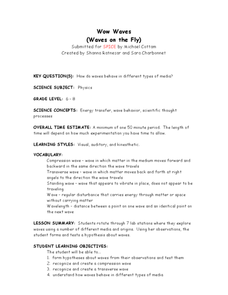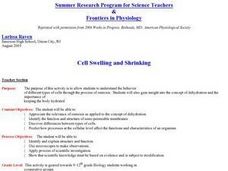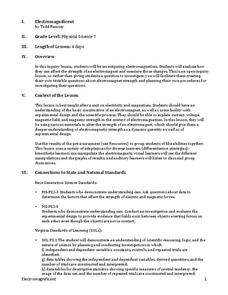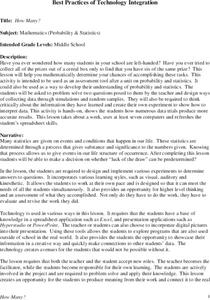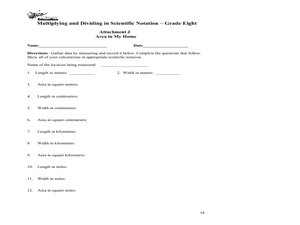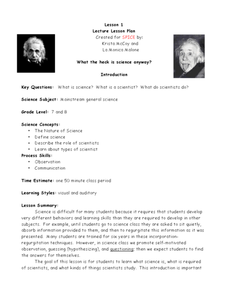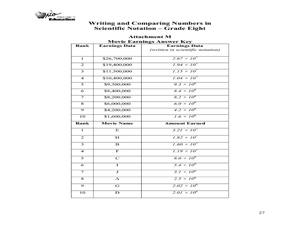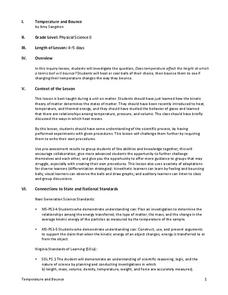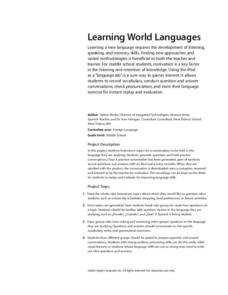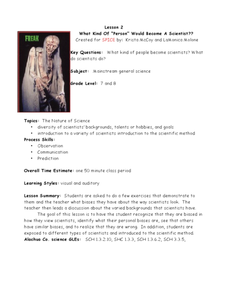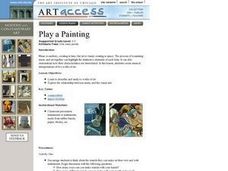Perkins School for the Blind
Conductors of Heat - Hot Spoons
Why is the end of a spoon hot when it's not all the way in the hot water? A great question deserves a great answer, and learners with visual impairments will use their auditory and tactile senses to get that answer. A talking...
Curated OER
Rhythm and Art: Gesture Drawing
Students explore connections between non-verbal language and art. In this visual and auditory art lesson, students investigate the science of sound and principles of drawing. They then use various genres of music to directly apply that...
Curated OER
Poetry Pals
Learners create the components for a slideshow featuring their own poetry, illustrations, and music. This lesson uses auditory, visual and kinesthetic (signing and clapping) learning styles.
American Chemical Society
Heat, Temperature, and Conduction
How does heat move from one item to another, even when the items are in different states of matter? Pupils experiment with adding washers to hot water and adding hot washers to room temperature water to observe the heat transfer.
Curated OER
Wow Waves (Waves on the Fly)
Young scholars formulate hypotheses on wave behavior and test them. In this physics lesson plan, students compare and contrast transverse and compression waves. They determine the wavelength of transverse waves.
Curated OER
The Living Environment
Sixth graders show what they know about plant and animal cells. In this cell project lesson, 6th graders get to choose a project based on their learning style. They can create a visual representation of cells, auditory forms, or build a...
Curated OER
Find information for Reports
Fifth graders research different sources for a report. In this research lesson, 5th graders find their information based on their learning style. Students are broken into 3 groups: auditory, visual, and interpersonal learners.
Curated OER
Cell Swelling and Shrinking
Young scholars examine the concept of osmosis in relation to dehydration. They identify the function and structure of semi-permable membranes. They predict how certain processes can affect the characteristics of an organism.
Curated OER
Which Shall We Pick?
Students compare and contrast the value of different organizations in their community. They listen to subjective and objective perspectives to make a decision. They use the decision-making process to decide which organization needs...
Perkins School for the Blind
Following Directions
Turn the act of following directions into a fun and engaging game! Especially designed for students with cognitive or intellectual disabilities, this lesson uses a game format as a natural reinforcer. Write a set of directions onto a set...
Curated OER
What is the Setting of a Story?
First graders explore the concepts of what setting is and how it's determined in a story. They play the KidWorks program to help facilitate the setting in a story. They use resources such as a picture dictionary or word wall to find and...
STEM for Teachers
Electromagnificent
This physics pun really hertz, but this STEM lesson plan can help. The inquiry-based activity has young scientists create a testable question about electromagnetic strength; plan and implement their own experiments; and record and...
Curated OER
Exploring Magnets and Magnetism
Here is a very good lesson on magnets, magnetism, and magnitic fields that is chock full of great activities for you to implement with your young scientists. Learners discover the properties of magnets, look at the forces of attraction...
Curated OER
Who Knows the Letter?
Help learners identify initial consonant sounds and letters that represent that sound. They indicate awareness of consonant sounds and letters by responding with a physical movement. They also sing using "Sing Your Way Through Phonics"...
Curated OER
How Many?
Middle schoolers explore and design ways to collect data through simulations and random samples. They perform two experiments to determine the answers to various probability problems, and present the data/graphs in the form of a...
Ohio Department of Education
Multiplying and Dividing in Scientific Notation - Grade 8
Here is really nice set of resources on scientific notation. Eighth and ninth graders explore the concept of multiplying and dividing in scientific notation. In this multiplying and dividing numbers in scientific notation lesson,...
Curated OER
What the Heck Is Science Anyway?
Here is a 12-page outline of an introductory science lesson. The teacher lectures on what science is, the role of a scientists, different disciplines of science, and the impact of scientific discoveries. Detailed lecture notes are...
Curated OER
Multiplication
Students practice their multiplication facts by reinforcement and repetition. Students write facts in their math journals, and use labeled soccer ball and deck of cards to practice multiplying by "number of the day." Play continues until...
Ohio Department of Education
Writing and Comparing Numbers in Scientific Notation-Grade Eight
Explore scientific notation in this mathematics lesson. Young mathematicians explore multiple representations of large number in scientific notation through the use of models, visual representation and expanded form. The lesson provided...
STEM for Teachers
Temperature and Bounce
Take part in a fun experiment and hold an impromptu bouncing contest with your class. Young scientists heat and cool balls before bouncing them to determine whether temperature changes affect how they bounce. The set of STEM lesson plans...
Curated OER
Learning World Languages
Students brainstorm topics for a conversation to be held in the language they are studying. They generate questions and hold practice conversations. Pupils record question and answers with an iPod and a voice recorder. When they are...
Curated OER
Beginning and Ending Sounds - Lesson 1 of 2
Stamp, slap, and clap! Emergent readers demonstrate their awareness of the initial, medial vowel, and final sounds in spoken, short vowel, single-syllable words with a stamp/slap/clap activity. After identifying the letters and sounds of...
Curated OER
What Kind of "Person" Would Become a Scientist?
"Scientist Stereotypes" could be another name for this instructional activity! Begin by drawing from middle schoolers' preconceived notions and media portrayal of scientists, and then explain that anyone can be a scientist. Even though...
Curated OER
Play a Painting
Students examine music and art together and see the distinctive elements of each form. It can also demonstrate how their characteristics are interrelated. They create musical interpretations of two works of art.






